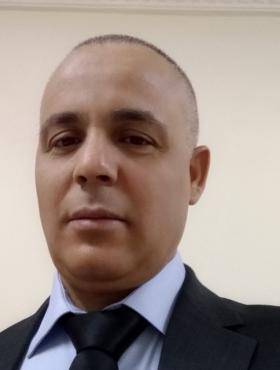Announcements

Lotfi BEN TAHER
Dr. Lotfi Mohammad Ben Tahar is a Full Professor of Inorganic Chemistry at the Department of Chemistry in the College of Science at Northern Border University, Arar, Saudi Arabia. He holds a Ph.D. of Inorganic Chemistry from the University of Carthage, Tunisia, in 2001 AD. Since the academic year 1436/ 1437 AH until present, he is a Contracted teaching member with the Northern Border University. Professor Ben Tahar was actively implicated in the preparation and the teaching of various courses including General Chemistry(I), General Chemistry(II), Inorganic Chemistry (I), Inorganic Chemistry (II), Coordination Chemistry, Organometallic Chemistry, Experimental Inorganic Chemistry, Fundamentals of Nanomaterials and Nanotechnology, Nanochemistry, Training Course, Research Project, Special Topics in Inorganic Chemistry, Solid State Chemistry, Industrial Inorganic Chemistry, etc. In the academic year 1438/1439 AH, he was the Head of Department of the Chemistry Department in the College of Science. Additionally, Prof. Ben Tahar also participated as a member or as president in various committees in both his Chemistry Department and the College of Science.
The research activities of Professor Ben Tahar are essentially focused on inorganic magnetic nanomaterials regarding their elaboration, their surface functionalization, their structural/microstructural characterization, their electrical and magnetic properties, their adsorptive efficiency, their citoxicity, etc. The nanomaterials are produced by wet chemistry routes such as the coprecipitation, the polyol method, the sol-gel method, etc. With his experience in theoretical and applied Inorganic Chemistry, Professor Ben Tahar has made substantial contributions to several fields, including Materials Science, Environmental remediation, Biomedicine, Electromagnetic materials and Magnetic nanomaterials. Further, he is a member of the Laboratory of Laboratory of Hetero-Organic Compounds and Nanostructured Materials since 1997 (Faculty of Science of Bizerte, University of Carthage, Tunisia). This membership reveals his devotion to collaborative research and his ability to efficiently cooperate with colleagues globally. Prof. Ben Tahar's dedication to the pursuit of knowledge and his national and international perspective are evident through his more than 40 publications in highly reputed journals, more than 20 international conferences held in Tunisia and Europe and the supervision and co-supervision of more than 50 students from different degrees including bachelor, MsC. and pH.D. Additionally, Prof. Ben Tahar’s involvement as an Editorial Board Member for “CIREA Journal of Chemistry” and as a reviewer for many submitted papers for various international journals features his recognition in the academic community as a trusted.
